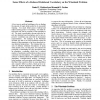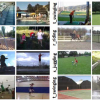25 search results - page 1 / 5 » Some Effects of a Reduced Relational Vocabulary on the Whodu... |
IJCAI
2007
13 years 6 months ago
2007
A key issue in artificial intelligence lies in finding the amount of input detail needed to do successful learning. Too much detail causes overhead and makes learning prone to ove...
CVPR
2009
IEEE
14 years 11 months ago
2009
IEEE
In this paper, we propose a novel approach for learning generic visual vocabulary. We use diffusion maps to au-tomatically learn a semantic visual vocabulary from ab-undant quantiz...
CDC
2008
IEEE
13 years 11 months ago
2008
IEEE
We develop a novel localization theory for planar networks of nodes that measure each other’s relative position, i.e., we assume that nodes do not have the ability to perform me...
IAT
2010
IEEE
13 years 1 months ago
2010
IEEE
Abstract--Collaborating agents require either prior agreement on the shared vocabularies that they use for communication, or some means of translating between their private ontolog...
LOBJET
2002
13 years 4 months ago
2002
Coping with huge amounts of data is one of the major problems in the context of software evolution. Current approaches reduce this complexity by filtering out irrelevant informatio...


